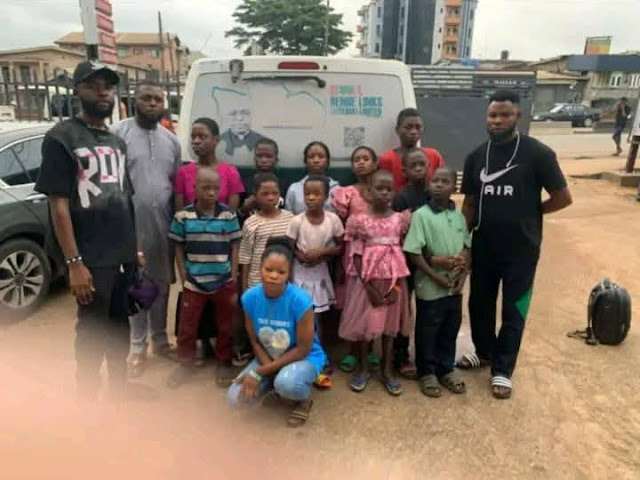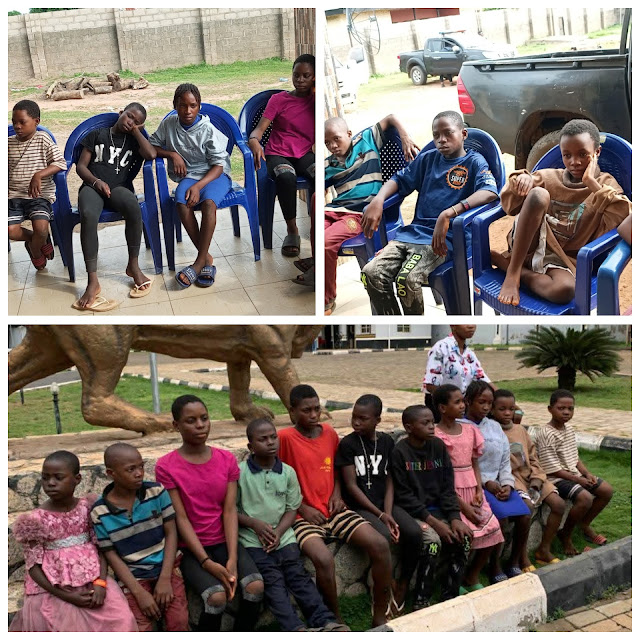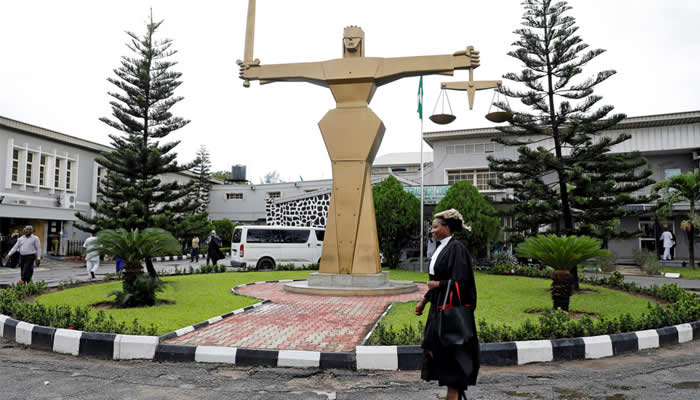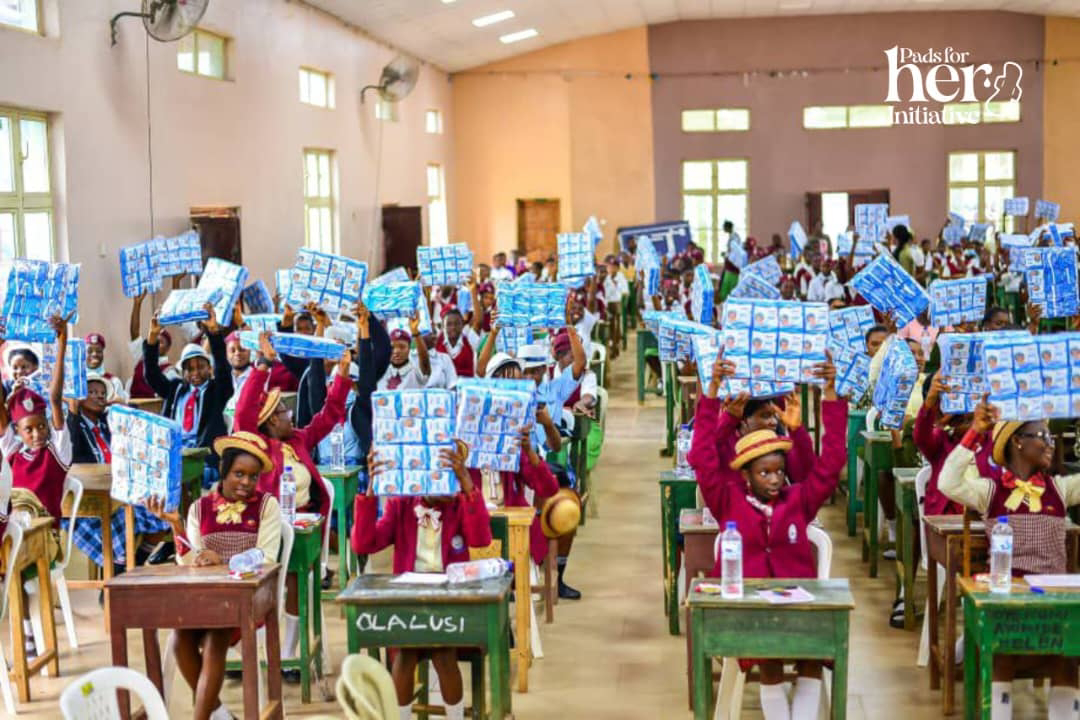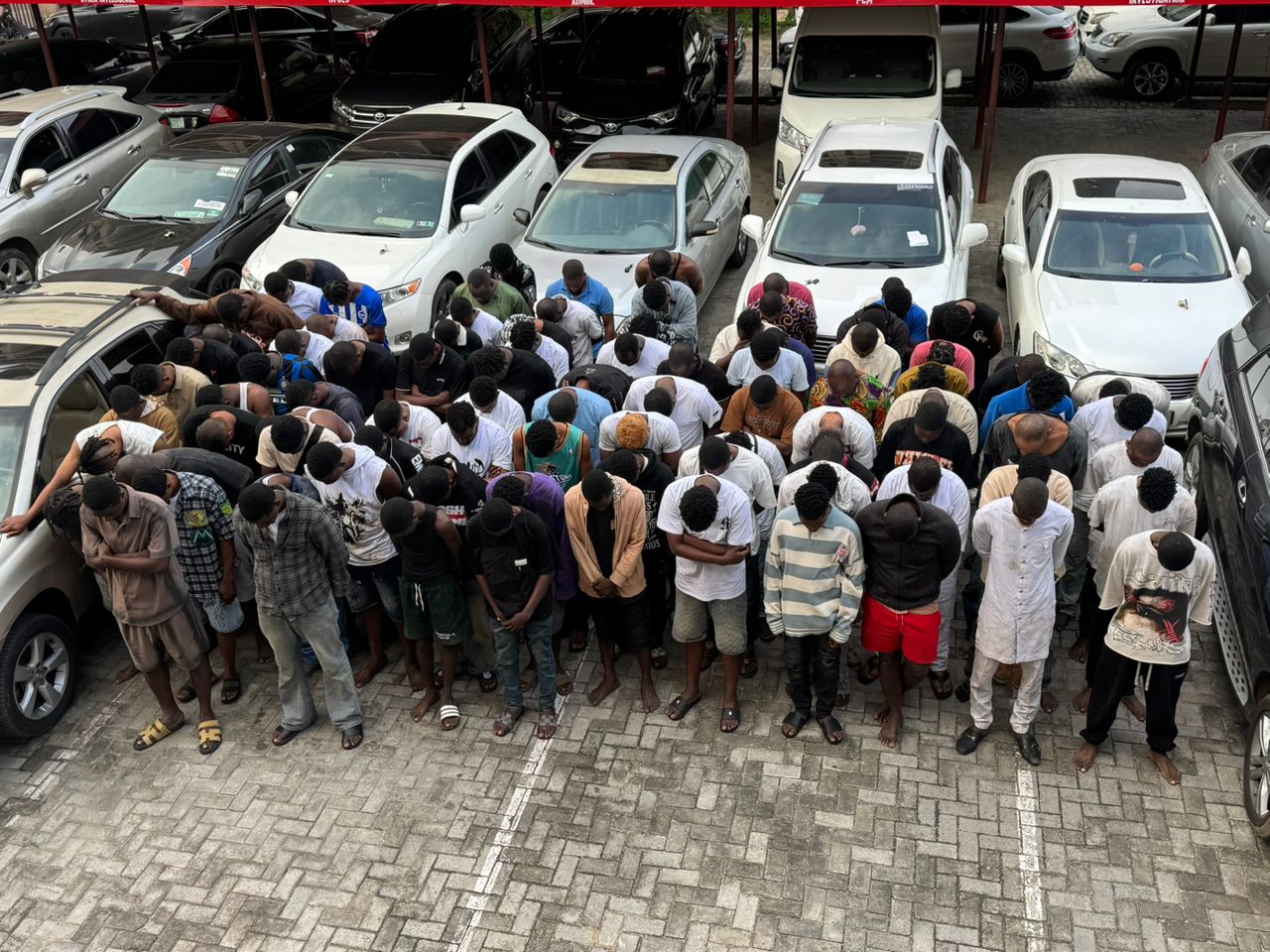In a shocking case that has sent ripples of outrage through Nigeria, the Benue State Police Command has arrested a suspected female child trafficker, Mhirve Terlumun, following the rescue of 11 children allegedly trafficked from Katsina-Ala Local Government Area in Benue State to Edo State. The children, aged between 5 and 20, were reportedly sold to buyers in Benin City for a mere N30,000 each, under the pretext of covering “transport money.” The rescue operation, a collaborative effort between the Benue State Government and the Tiv Youth Organization (TYO) Edo State Chapter, led by Comr. Agber Akaajime, culminated in the safe return of the children to Katsina-Ala on Saturday, August 23, 2025. The incident, described as “barbaric, inhumane, and totally unacceptable” by local authorities, has reignited concerns about child trafficking in Nigeria, prompting calls for stronger measures to protect vulnerable populations. This article delves into the details of the case, the rescue operation, the broader issue of child trafficking, and the implications for Nigeria’s social and legal systems.
The Arrest and Rescue Operation
The arrest of Mhirve Terlumun marks a significant breakthrough in the fight against child trafficking in Benue State, a region that has grappled with security challenges, including banditry and communal conflicts. Terlumun, identified as a native of Mbajir, Shitile in Katsina-Ala, was apprehended by the Benue State Police Command after a meticulous investigation triggered by the discovery of her alleged trafficking activities. According to reports, Terlumun orchestrated the trafficking of 11 children from Katsina-Ala to Benin City, Edo State, where she sold them to unidentified buyers for N30,000 each—a sum equivalent to approximately $18 USD at current exchange rates.
The rescued children, whose names were listed by security analyst Zagazaola Makama, include Iwuese Terkimbi (5 years), Sulma Terhemen (7), Sechiur Orsuyi (8), Sunday Mlumum (20), Nguveren Sunday (15), Doose Mwaave (12), Ternenge Wuave (11), Mnena Terhemen (16), Aondonengen Terkimbir (12), Nensha Terhemen (10), and Saakuma Terhemen (13). The age range of the victims, from 5 to 20, underscores the vulnerability of minors and young adults targeted by traffickers, who exploit their socioeconomic conditions and lack of protection.
The case came to light on August 18, 2025, when Comr. Agber Akaajime, president of the TYO Edo State Chapter, uncovered the trafficking syndicate’s operations. Acting on intelligence, Akaajime initiated a thorough search in Benin City, collaborating with local authorities and community leaders to locate the children. The rescue operation, supported by the Benue State Government, was a testament to the power of community vigilance and inter-agency cooperation. On Saturday, August 23, the 11 children were safely returned to Katsina-Ala, where they were reunited with their families, marking a moment of relief amid the harrowing ordeal.
The Chairman of Katsina-Ala Local Government Area, Hon. Dr. Justine Shaku, confirmed the development in a statement issued on Sunday, August 24, 2025. Signed by his Personal Assistant on Media and Publicity, the statement condemned the trafficking as “barbaric, inhumane, and totally unacceptable,” reflecting the outrage felt by local leaders and residents. Shaku praised the efforts of the TYO and the state government, emphasizing the need for justice and preventive measures to ensure such incidents do not recur.
The Investigation: Unraveling the Syndicate
Following Terlumun’s arrest, the Benue State Police Command’s Criminal Investigation Department (CID) launched a comprehensive investigation to uncover the full scope of the trafficking operation. Security analyst Zagazaola Makama, who confirmed the development on Monday, August 25, 2025, noted that the CID is working to identify additional members of the syndicate, including the buyers in Benin City who purchased the children. The investigation aims to trace the network’s operations, determine how the children were lured or abducted, and uncover any systemic failures that allowed the trafficking to occur undetected.
Preliminary findings suggest that Terlumun operated under the guise of providing “transport money” to facilitate the movement of the children, a pretext that masked the true nature of her activities. This deceptive tactic is common among traffickers, who exploit trust within communities to gain access to vulnerable children. The fact that the children were sold for such a low price—N30,000 each—highlights the commodification of human lives in trafficking networks, where profit motives override ethical considerations.
The investigation is also exploring the socioeconomic factors that made the children vulnerable. Katsina-Ala, located in Benue State’s North Central region, is a predominantly agrarian area with high poverty rates and limited access to education and healthcare. These conditions create fertile ground for traffickers, who target families struggling to survive. The involvement of a local resident like Terlumun raises concerns about community-level complicity, whether intentional or through ignorance, in enabling such crimes.
The Broader Issue of Child Trafficking in Nigeria
The rescue of the 11 children in Benue State is a stark reminder of the pervasive problem of child trafficking in Nigeria, a country that has long battled human trafficking in various forms. According to the International Organization for Migration (IOM), Nigeria is a source, transit, and destination country for human trafficking, with children making up a significant portion of victims. The U.S. Department of State’s 2024 Trafficking in Persons Report classified Nigeria as a Tier 2 country, indicating significant efforts to combat trafficking but ongoing challenges in meeting minimum standards.
Child trafficking in Nigeria takes many forms, including forced labor, domestic servitude, sexual exploitation, and organ trafficking. Children are often targeted due to their vulnerability, with poverty, conflict, and lack of education increasing their risk. In Benue State, ongoing communal clashes and displacement due to banditry have exacerbated these vulnerabilities, leaving many families unable to protect their children. The case of the 11 children sold for N30,000 each underscores the chilling reality that traffickers exploit these conditions to prey on the most defenseless.
The trafficking route from Katsina-Ala to Benin City highlights a well-established corridor for human trafficking in Nigeria. Edo State, particularly Benin City, has long been a hub for trafficking networks, with many victims destined for exploitation in Nigeria or abroad, including in Europe and the Middle East. The involvement of a local syndicate leader like Terlumun suggests that trafficking networks operate at both community and regional levels, requiring coordinated efforts to dismantle them.
Community and Government Response
The successful rescue of the 11 children is a testament to the power of community action and government collaboration. Comr. Agber Akaajime’s leadership in uncovering the syndicate and mobilizing resources for the search in Benin City demonstrates the critical role of grassroots organizations like the TYO. The organization, which represents the interests of the Tiv ethnic group in Edo State, leveraged its networks to locate the children, highlighting the importance of community vigilance in combating trafficking.
The Benue State Government’s involvement was equally crucial, providing logistical and institutional support for the rescue operation. Governor Hyacinth Alia’s administration has prioritized security and social welfare, with initiatives aimed at addressing the root causes of vulnerability, such as poverty and displacement. The government’s swift response in this case, including the safe return of the children to Katsina-Ala, reflects a commitment to protecting citizens and holding perpetrators accountable.
Hon. Dr. Justine Shaku’s statement condemning the trafficking as “barbaric, inhumane, and totally unacceptable” resonates with the sentiments of many Nigerians who view such acts as a betrayal of cultural and moral values. The Tiv community, known for its strong familial and communal bonds, has been particularly shaken by the involvement of a local woman in the syndicate, prompting calls for greater awareness and preventive measures.
Legal and Policy Implications
The arrest of Mhirve Terlumun and the ongoing CID investigation signal a robust legal response to the trafficking case. Under Nigeria’s Trafficking in Persons (Prohibition) Enforcement and Administration Act of 2015, administered by the National Agency for the Prohibition of Trafficking in Persons (NAPTIP), trafficking in children is a serious offense punishable by up to seven years in prison and fines. If convicted, Terlumun could face significant penalties, particularly given the number of victims and the premeditated nature of the crime.
The investigation will also seek to identify and prosecute the buyers in Benin City, who are complicit in the trafficking chain. Holding demand-side actors accountable is critical to dismantling trafficking networks, as buyers create the market that fuels these crimes. The case could set a precedent for stronger enforcement against trafficking syndicates, particularly in regions like Edo State, where such activities have persisted despite government efforts.
At the policy level, the incident underscores the need for comprehensive strategies to address the root causes of trafficking. Poverty alleviation programs, access to education, and community-based protection mechanisms are essential to reducing vulnerability. The Benue State Government could expand initiatives like vocational training, microfinance schemes, and school feeding programs to support families in Katsina-Ala and other high-risk areas. Collaboration with organizations like NAPTIP, the IOM, and local NGOs can enhance these efforts, ensuring a multi-faceted approach to prevention and response.
Societal and Cultural Dimensions
The trafficking of 11 children from Katsina-Ala has profound societal and cultural implications, particularly within the Tiv community. The Tiv, one of Nigeria’s largest ethnic groups, place a high value on family and community, making the betrayal by a local resident like Terlumun particularly shocking. The incident has sparked discussions about the erosion of traditional values in the face of economic hardship and the need for community leaders to play a more active role in protecting vulnerable members.
The low price of N30,000 per child has also ignited outrage, highlighting the devaluation of human life in trafficking networks. In a country where the minimum wage is N70,000 per month, the fact that children were sold for less than half that amount underscores the desperation and greed driving such crimes. Social media platforms like X have been abuzz with reactions, with users expressing anger and calling for justice using hashtags like #BenueTrafficking and #JusticeForVictims.
The case also raises questions about gender dynamics in trafficking. While women are often victims of trafficking, the involvement of a female syndicate leader like Terlumun challenges stereotypes and highlights the complexity of these networks. Women may be drawn into trafficking due to economic pressures or coercion, but their participation as perpetrators underscores the need for gender-sensitive approaches to prevention and prosecution.
The Role of Community Vigilance
The TYO’s role in uncovering the trafficking syndicate highlights the power of community vigilance in combating crime. Comr. Agber Akaajime’s proactive approach, from gathering intelligence to coordinating the search in Benin City, demonstrates how grassroots organizations can complement government efforts. The TYO’s success in this case could inspire other community groups to monitor their environments and report suspicious activities, creating a network of local watchdogs.
Community vigilance is particularly important in rural areas like Katsina-Ala, where government presence may be limited. Traditional leaders, religious institutions, and youth organizations can play a critical role in educating families about the risks of trafficking and empowering them to protect their children. Awareness campaigns, conducted in local languages like Tiv, can ensure that communities are equipped to recognize and respond to trafficking attempts.
The Path Forward: Justice and Prevention
As the CID investigation progresses, the focus will be on securing justice for the 11 rescued children and their families. The prosecution of Mhirve Terlumun and her accomplices must be thorough and transparent, sending a strong message that trafficking will not be tolerated. NAPTIP’s involvement will be crucial in ensuring that the case is handled with the seriousness it deserves and that the victims receive psychosocial support to recover from their ordeal.
Preventing future trafficking incidents requires a multi-pronged approach. The Benue State Government should invest in social safety nets, such as scholarships and healthcare programs, to reduce the economic pressures that make families vulnerable. Strengthening security in Katsina-Ala, including community policing and collaboration with federal agencies, can deter criminal activities. Partnerships with NGOs and international organizations can provide resources and expertise to enhance anti-trafficking efforts.
The rescued children, ranging in age from 5 to 20, will need ongoing support to reintegrate into their communities. Trauma counseling, educational opportunities, and family reunification programs are essential to help them rebuild their lives. The government and civil society must work together to ensure that these children are not re-victimized and that their stories inspire action to protect others.
Broader Implications for Nigeria
The Benue trafficking case is a microcosm of Nigeria’s broader challenges with human trafficking, poverty, and insecurity. The country’s high poverty rate—over 40% of the population lives below the poverty line, according to the World Bank—creates a fertile ground for traffickers to exploit vulnerable communities. Addressing these systemic issues requires long-term investments in education, healthcare, and economic development, as well as stronger governance to tackle corruption and impunity.
The case also highlights the importance of regional cooperation, as trafficking networks often operate across state lines. Benue and Edo States, both affected by this incident, must collaborate to dismantle trafficking routes and share intelligence. The Federal Government can support these efforts by strengthening NAPTIP’s capacity and enacting policies that prioritize child protection.
Conclusion: A Call to Action
The arrest of Mhirve Terlumun and the rescue of 11 trafficked children from Katsina-Ala to Benin City is a sobering reminder of the persistent threat of child trafficking in Nigeria. The incident, uncovered on August 18, 2025, and resolved with the children’s return on August 23, reflects the power of community vigilance and government collaboration in combating crime. However, it also underscores the urgent need for systemic reforms to address the root causes of trafficking, from poverty to lack of education.
The Benue State Police Command’s ongoing investigation, supported by NAPTIP and local leaders, offers hope for justice, but the fight is far from over. The stories of Iwuese Terkimbi, Sulma Terhemen, and the other rescued children must serve as a catalyst for change, inspiring Nigeria to strengthen its protections for vulnerable populations. As the nation grapples with this “barbaric, inhumane, and totally unacceptable” crime, the collective response—through law enforcement, policy reform, and community action—will determine whether Nigeria can turn the tide against trafficking and build a safer future for its children.


